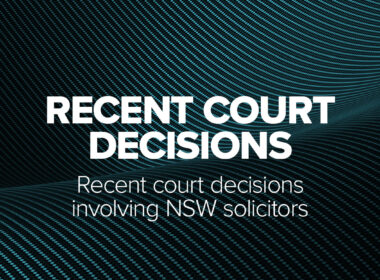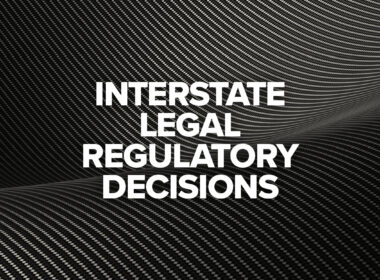Taking the plunge to set up your own law practice can be both exciting and daunting. It is a significant milestone in the career of any solicitor and marks the moment when you take the reins and forge a path for how you want to deliver legal services.
Between getting a principal’s practising certificate, setting up the right business structure and registering the law practice with regulatory bodies, there are a number of steps that need to be taken before a solicitor can start delivering legal services on their own account. One of the critical steps in this process is putting in place a template costs disclosure and costs agreement.
As the legal industry evolves with technologies that enable more efficient ways of delivering legal services, so too are solicitors getting more creative in how they harness these technologies to adapt to changing client needs and seize new opportunities in the legal services market. In this shift away from traditional methods of legal practice, the NSW Law Society’s Professional Support Unit is receiving an increasing number of enquiries from solicitors wanting to know what to put in their terms of engagement.
When it comes to legal costs, practitioners are reminded of their obligations under NSW legal costs legislation.[1] So long as you meet these obligations, how you structure, and the terms you put in, your costs agreement is up to you. Think about the nature of your legal practice and the clients you serve. If your template agreement is bespoke and you want to make sure you have not strayed away from your regulatory obligations, then perhaps independent legal advice is warranted.
This article sets out key provisions under NSW legal costs legislation, which is a starting point for practitioners drafting or reviewing their template costs disclosure and costs agreement.
Key provisions under NSW legal costs legislation
No matter how you choose to service your clients – whether you have a virtual law practice, or only provide services to other law practices, or you have an unbundled services model – consider the following requirements.[2]
- Legal costs must be fair and reasonable.
Subsection 172(1) of the Uniform Law provides that a law practice must, in charging legal costs, charge costs that are no more than fair and reasonable in all the circumstances and that in particular are (a) proportionately and reasonably incurred, and (b) proportionate and reasonable in amount.
Satisfying this obligation requires consideration of the factors set out in subsection 172(2), including the level of skill, experience, specialisation and seniority of the practitioners delivering the services; the level of complexity, novelty or difficulty of the issues involved; and the quality of the work done.
- Legal costs must be disclosed to the client in writing.
Unless an exception applies,[3] a law practice must provide the client written information disclosing the basis on which legal costs will be calculated in the matter and an estimate of the total legal costs. This is set out in section 174 of the Uniform Law. Remember that the total estimate, which should include the law practice’s professional fees plus disbursements plus GST, must be a single figure, not a range.[4]
Disclosure is not required in the following circumstances:
- If the total legal costs, are not likely to exceed $750.00 (excluding GST and disbursements).
- If the client is a commercial or government client, as set out in section 170 of the Uniform Law.
In relation to the latter, those clients are sometimes referred to as sophisticated clients, clients who have more business acumen and awareness of costs. They might be regular uses of legal services as opposed to consumer type clients. Sophisticated clients could include a law practice, a public company, a foreign company, a liquidator, the Crown, or a large partnership.
- Additional written information regarding the client’s rights must be provided.
Section 174 of the Uniform Law prescribes more than disclosure of legal costs. Practitioners who have an obligation to disclose costs to a client need to be mindful of the additional written disclosures that are required under subsection 174(2), which are the client’s right to:
- negotiate a costs agreement with the law practice; and
- negotiate the billing method (for example, by reference to timing or task); and
- receive a bill from the law practice and to request an itemised bill after receiving a bill that is not itemised or is only partially itemized; and
- seek the assistance of the designated local regulatory authority in the event of a dispute about legal costs.
- Interest is not considered ‘legal costs’ under the Uniform Law.
The definition of ‘legal costs’ under section 6 of the Uniform Law expressly excludes interest. Practitioners should refer to section 195 of the Uniform Law when considering the ‘interest’ clause of their costs agreement.
Remember that a law practice cannot charge interest on unpaid legal costs unless the bill for those costs contains a statement that interest is payable and the rate of interest.[5]
- Conditional costs agreements should define what “success” means.
If you are putting together a conditional costs agreement, where payment under the agreement is conditional on “success” to the client, practitioners need to define what a successful outcome to the client is. Consider the scope of the retainer and the client’s expectations.
The decision in Musgrave v SRM Lawyers Pty Ltd [2023] NSWDC 242 discusses this issue and should be considered against subsection 181(2) of the Uniform Law.
- Contingency fees are prohibited.
Subsection 183(1) of the Uniform Law prohibits a law practice from entering into a costs agreement under which the amount payable to the law practice, or any part of that amount, is calculated by reference to the amount of any award or settlement or the value of any property that may be recovered in any proceedings to which the agreement relates.
The prohibition set out above does not apply in respect of regulated costs for probate and administration matters. Neither do they apply in respect of regulated costs for motor accident claims.
- A law practice cannot contract out of a costs assessment.
Clients have a right to seek an assessment of the whole or part of legal costs payable to a law practice,[6] and solicitors cannot put a clause in a costs agreement which provides that the legal costs charged under the agreement are not subject to a costs assessment.[7]
- A client must understand and consent to the arrangement proposed.
No matter how carefully you craft and construct your costs disclosure and costs agreement, remember that it will not serve you if you do not also make sure that your client has understood the proposed arrangement and given their consent.[8]
A law practice must take all reasonable steps to satisfy itself that the client has understood and given consent to the proposed course of action for the conduct of the matter and the proposed costs. What is considered reasonable will depend on the client and the context in which disclosure was made.[9]
Practitioners should refer to the decisions in Todorovska v Brydens Lawyers Pty Ltd [2022] NSW NSWCA 47 and Malvina Park Pty Ltd v Johnson [2019] NSWSC 1490 for guidance on reasonable steps. The Professional Support Unit has previously published a case summary of Todorovska, available .
Obligations once the client retainer is afoot
Remember that disclosure obligations under the legal costs legislation are ongoing. A clause in your costs agreement giving the law practice an ability to charge by the hour for any additional out of scope work is unlikely to be sufficient disclosure if there is a significant change to anything previously disclosed.
If there is a significant change to work that needs to be undertaken in a matter, therefore impacting legal costs that will be payable by the client, you need to let the client know[10] and give the client sufficient and reasonable amount of information about the impact of the change on legal costs, so that the client can make informed decisions about the future conduct of the matter.[11]
Costs agreement precedents and the Cost Guide
The Costs Committee of the Law Society has prepared two costs disclosure and costs agreement precedents, one for a fixed/time fee based and another one for conditional costs agreements. The costs precedents are available to members on the Law Society website for use and adaptation. The Costs Committee has also published the Costs Guide (7th Edition) which is a comprehensive and useful guide on all matters relating to legal costs.
Further support and guidance
In addition to the costs precedents and Costs Guide, the Law Society has a range of resources to assist practitioners meet their obligations under legal costs legislation.
If further guidance is needed, practitioners can contact the Law Society Professional Support Unit (PSU) for assistance. PSU provides free and confidential guidance, support and legal information to legal practitioners seeking assistance with their obligations under the legal profession legislation.
The Costs line handles inquiries related to billing, fees and other expenses a solicitor may charge a client. Common costs enquiries relate to costs disclosure, costs agreements and billing.
| Costs | (02) 9926 0116 | costs@lawsociety.com.au |
| Ethics | (02) 9926 0114 | ethics@lawsociety.com.au |
| Regulatory Compliance | (02) 9926 0115 | regulatory.compliance@lawsociety.com.au |
[1] Refer to the definition of ‘legal costs legislation’ under section 3A of the Legal Profession Uniform Law Application Act 2014 (NSW).
[2] Legal services to clients who are considered commercial or government clients under section 170 of the Legal Profession Uniform Law (NSW) (Uniform Law) are exempt from certain costs provisions under the Uniform Law, including disclosure and billing obligations.
[3] See Legal Profession Uniform Law (NSW) s170(1), s174(4) and clause 18(3) of Schedule 4
[4] Legal Services Council, Legal Profession Uniform Law Guideline & Direction: Costs estimates (11 March 2016) https://legalservicescouncil.org.au/documents/Guidelines%20and%20Directions/LSC-Guideline-and-Direction-Costs-Estimates.pdf, paragraph 3.
[5] Legal Profession Uniform Law (NSW) s195(3).
[6] Legal Profession Uniform Law (NSW) s198(1)(a).
[7] Legal Profession Uniform Law (NSW) s180(4).
[8] Legal Profession Uniform Law (NSW) s174(3).
[9] Todorovska v Brydens Lawyers Pty Ltd [2022] NSW NSWCA 47; Malvina Park Pty Ltd v Johnson [2019] NSWSC 1490.
[10] Legal Profession Uniform Law (NSW) s174(1)(b).
[11] Ibid s174(2)(b).




